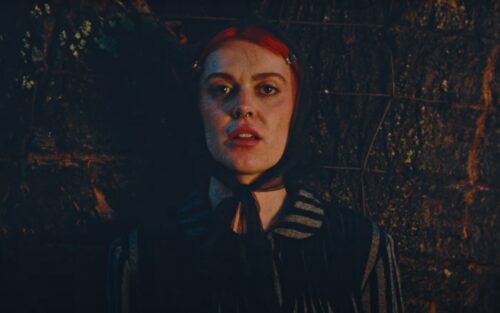Sister Ray Enjoys The Fruits Of Their Labour
Indie folk crooner Ella Coyes keeps the creative juices flowing while sinking their teeth into the past.
By Gregory Adams
Photos by Sam Tudor
- Published on
Teeth’s artwork, meanwhile, finds the artist posing in front of a Mid-Western farmers market advertising “black sweet cherries from our farm.” This signage indelibly connects to the way the title track drenches listeners with various berry-and-cherry-stained allusions. Though Sister Ray had already tracked the tune by the time they hit this particular roadside stop, it’s fair to say folksy grocers like these are foundational for the songwriter.
“I grew up going to Keremeos, a little orchard town in B.C.; my grandparents live out there,” Coyes explains to RANGE. “I’m a real sucker for a fruit stand… [it was] a huge part of my summers when I was a kid, and [it’s] a really big part of Teeth. Like, a direct reference in [the song] is going to those fruit stands, [and] just gorging on fruit.”
While sometimes a cherry is just a cherry, Sister Ray’s latest work likewise nods to the sensual symbolism fruit has held with storytellers for eons. Coyes does so with a wink on “Pressing Down,” a song that moves laterally from the fluorescent glow of the grocery store towards pillow talk, the songwriter asking of their handsy fruit-testing methods — above a bed of psychedelically floaty guitar effects — “Is that erotic to you?” Of the vividly-charged wordplay, Coyes notes they’re often drilling into relatable sensory experiences in their songwriting.
“I find it easy to connect with how they physically feel and smell,” they note, in particular, of Teeth’s ripest tangibles, “and connecting to that sensory experience through food…I don’t know, it’s kind of sexy, I guess.”


Teeth follows Sister Ray’s 2022 full-length, Communion, a collection Coyes explains began as a series of improvisational pieces before being refined over a period of years. Comparatively, Teeth’s three original songs — the EP is rounded out by a cover of the Carter Family’s “I Never Will Marry” — were written and recorded with Coyes’ backup band, ginla, within a matter of weeks. Like Communion, Teeth exists through the spacious, evocative strums Coyes casts on an old acoustic they copped as a teenager; fuller, trio-sized arrangements lock into effects-spangled folk-rock, while Coyes’ elemental, fluid-metered vibrato casually takes stock of various remembrances. “All Dogs Go to Heaven,” for instance, alludes to an old SNFU shirt an ex of Coyes’ hung onto long-term, and how it’s grown out of shape — perhaps as with that relationship — since its return.
“I do think nostalgia is a real through-piece in my writing,” Coyes allows, adding, “I’m always writing about things that have happened in my life, but very rarely — if ever — am I writing about them as they are occurring. It’s always in the past, with a sense of nostalgia. Even if I’m writing about sadness or despair, there is nostalgia for the intensity of [that] feeling.”
“Teeth” and “Pushing Down,” you could argue, are the more playful part of the EP. An implied solitude exists on the roots-rustic take of “I Never Will Marry,” which was partly inspired by repeated viewings of Johnny Cash and Linda Ronstadt’s 1969 performance of the piece on The Johnny Cash Show, vis-à-vis Coyes’ grandfather’s DVD collection. The cover is preceded by a parallel thought on the canyon-breezy “All Dogs Go to Heaven,” where Coyes implies that a night could take a provocative turn should a partner guess the narrator’s favourite made-for-TV movie. By the song’s end, as a short stretch of slide guitar vanishes into the ether, Sister Ray is left describing a great distance between the figures.
“That song is about wanting approval through sexual intimacy,” Coyes explains, adding that the piece also examines feigned power dynamics. “Like, saying that if you can recognize this really meaningless thing — it’s not a favourite movie; it’s a Hallmark movie that’s kind of empty, meaningless, and passive — that small [amount of] recognition [towards] my personhood could be the path to real intimacy. Nakedness, but through a path of something hollow.”
Like life, Sister Ray’s Teeth balances those heavy, heartbreaking moods with smirk-worthy moments — and sometimes that includes a bawdy tour of the produce section. It’s a levity Coyes certainly appreciates.
“I like being cheeky,” they reveal of the process. “I write sad songs, but I like to have funny little moments [placed] into an overall sense of sadness.”
By Stephan Boissonneault
Nate Amos revisits a decade of stray ideas and turns them into his most compelling record yet.
By Khagan Aslanov
Mike Wallace’s electro-punk project premieres the hypnotic, percussion-driven video for "Certain Days."











